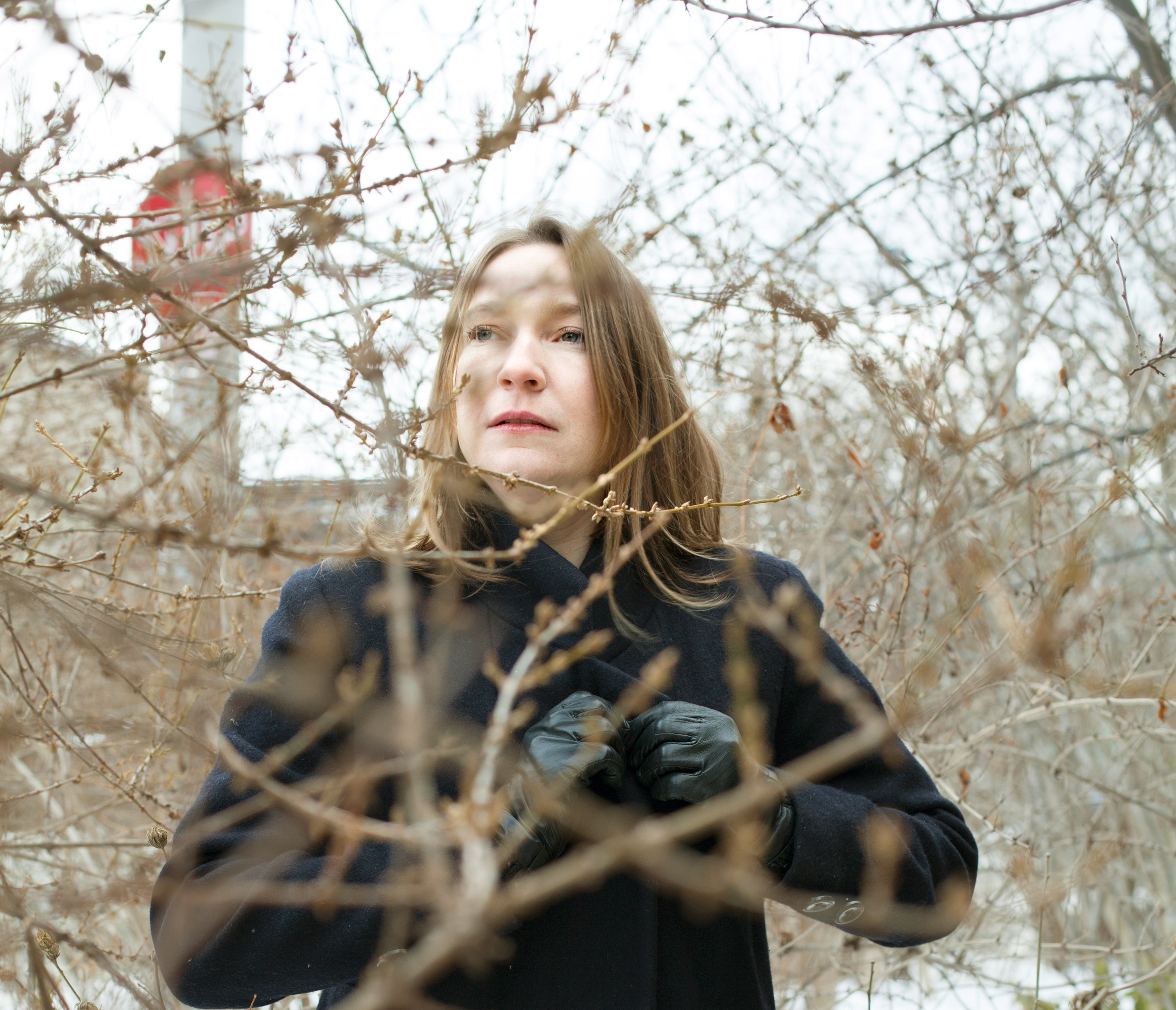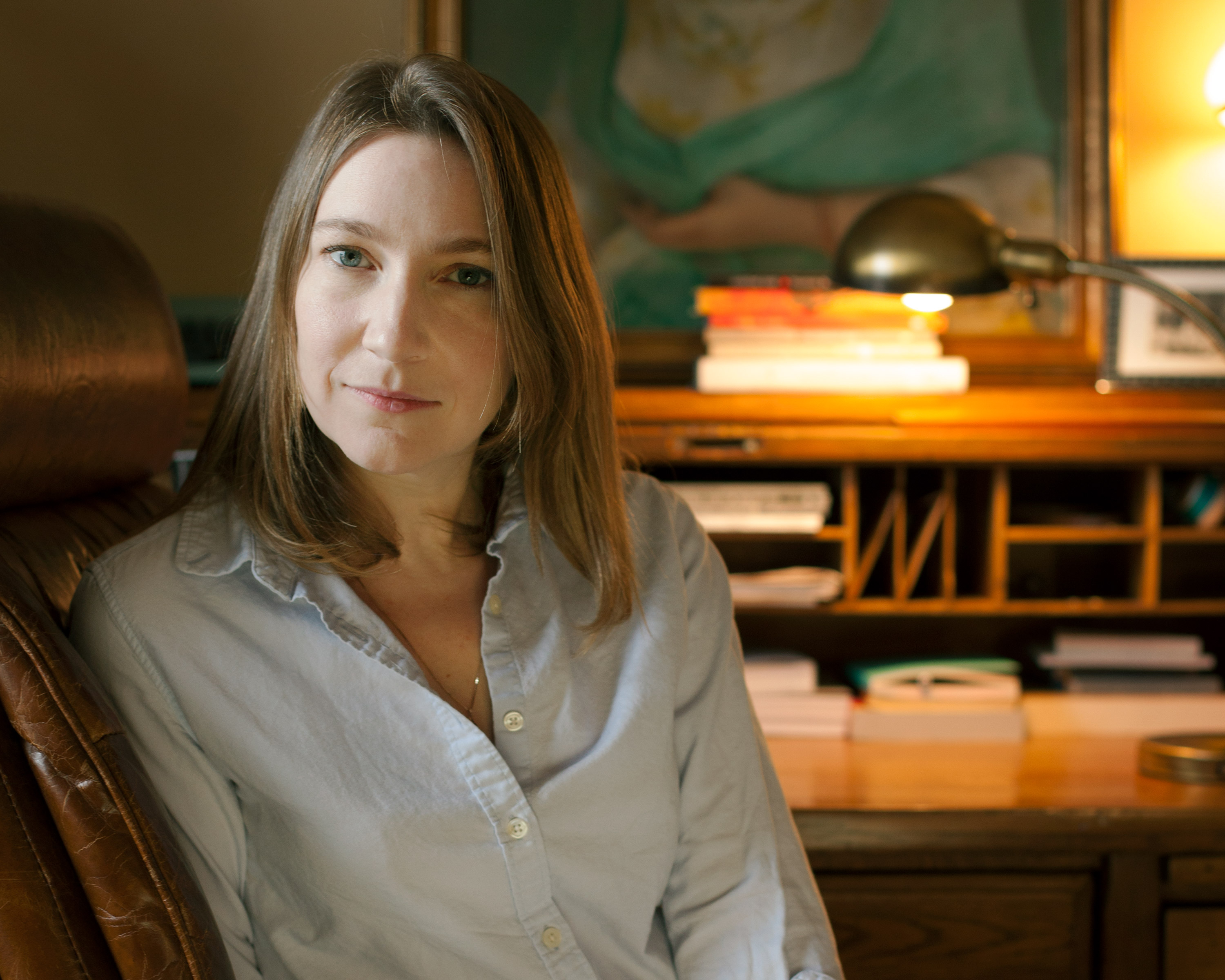
- Interview by Tina Essmaker February 23, 2017
- Photo by Charla Jones
Sheila Heti
- writer
The Toronto-based writer Sheila Heti, author of seven books, including the short story collection, The Middle Stories and the novel How Should a Person Be?, had no plan B. For her writing was it, and it was a decision she consciously made at age 21. That doesn’t mean it came easy, though. Here, she recalls how the support of friends and thinking long-term helped her push past moments of doubt, reflects on why crediting only our good qualities for where we end up is a mistake, and reveals how the mystery of creation is akin to a great love affair.
Tell me about where you grew up and how your childhood influenced your ideas about creativity. I grew up in Toronto. When I was in first or second grade, I had a club with my girlfriends, and we put on a Christmas play for our parents—even though we were all Jewish. I think that was an early positive experience of making art with other people and showing it. The showing it was always part of it. I never understood people who made art and didn’t show it to everyone. To me, that was part of the pleasure of it.
I also had a very supportive father who bought me paints and took me to ballet classes and the theater. He wasn’t an artist himself, but his father was an artist. My dad once took me to a soccer field, and I stood at the edge and cried. (laughing) I think it was obvious that I was drawn to art instead. He was very encouraging of me in that way, and I had a lovely childhood in that I felt very intimate with him and our house and our garden and my own imaginary world.
It’s incredible that you had the kind of support from a parent early on, because that can be rare. Yeah, my dad was a very curious person and was very attentive to who I was. I would show him stories I wrote, when I was seven or eight. Because of that relationship, I always had this feeling that there was some kind of intimacy in making. Art involves intimacy with yourself, but also with other people. It is a way of being close and exchanging love.
I like what you referenced earlier. You said that even from a young age, you wanted to share your art and didn’t understand why people choose not to share. Was it something you were aware of, or was it this innate drive to share? I don’t know if I was just a little kid showing off and wanting to be applauded and loved. I don’t think it occurred to me not to share. I still have to hold myself back from sharing drafts of my books with friends before they’re ready. I want to share with people and hear what they think. Writing is a way of talking to the people I love the most—that’s a huge aspect of writing for me.
I want to reference this quote from Mary Oliver’s book, Upstream, which I’m reading right now. She says, “The most regretful people on earth are those who felt the call to creative work, who felt their own creative power restive and uprising, and gave to it neither power nor time.”
“Art involves intimacy with yourself, but also with other people. It is a way of being close and exchanging love.”
That is a struggle for many of us who feel a call to creative work, but don’t know how to start or don’t believe it’s realistic. When did you first feel the call to creative work in the sense that it was a life that you wanted to create for yourself? I think it grew stronger every year, but there were a few important moments. For instance, around age 21, I made the decision that there was no alternative, there would be no plan B. It was the first time I felt that certainty. It wasn’t just some spiritual thing that came over me. It was a real decision.
If I hadn’t been able to recall that decision through the years, things might have gone differently. When you read me that quote, yes, I think everybody has creativity in them, and you have to apply will to it. If you don’t, it becomes the last thing you attend to in your day—and if you build days upon days, then it can end up the last thing you attend to in your life. It’s very hard to say that something that’s important to you, but is not important to anybody else, is still important to you. That’s the thing about making art—it’s not really pressing for anybody else, in the way it’s pressing for you, whereas all the practical things you have to do in a day are pressing for others.
Yes, the expectations of others. Once the work is out there and people are responding to it, it’s easier to see the value, but it’s difficult to make that connection up front before the work is created because there are so many demands in our everyday lives. Yeah, I mean, I also had a lot of encouragement from different friends along the way. My friend Misha Glouberman was someone who I spoke to a lot. I was so broke in my twenties and early thirties. I remember so many conversations where I was hanging out with him and asking, “Well, how do I make money?” He said, “Maybe it’s not going to make you the most money to write a story today, but if that’s what you want to do long-term, then that’s how you have to try to make money now, even though it will take time to pay off.”
He always encouraged me when I’d say that maybe I should be a hairdresser or work at a magazine or teach. He told me, “No, if you want to write, you have to start making money from writing.” That was very clarifying for me because I don’t think I would have been able to reason that out so well. I was just looking at it from the perspective that writing wouldn’t pay my bills that month, and it barely did, and I did have to take other jobs. But it was good to have that in my mind.
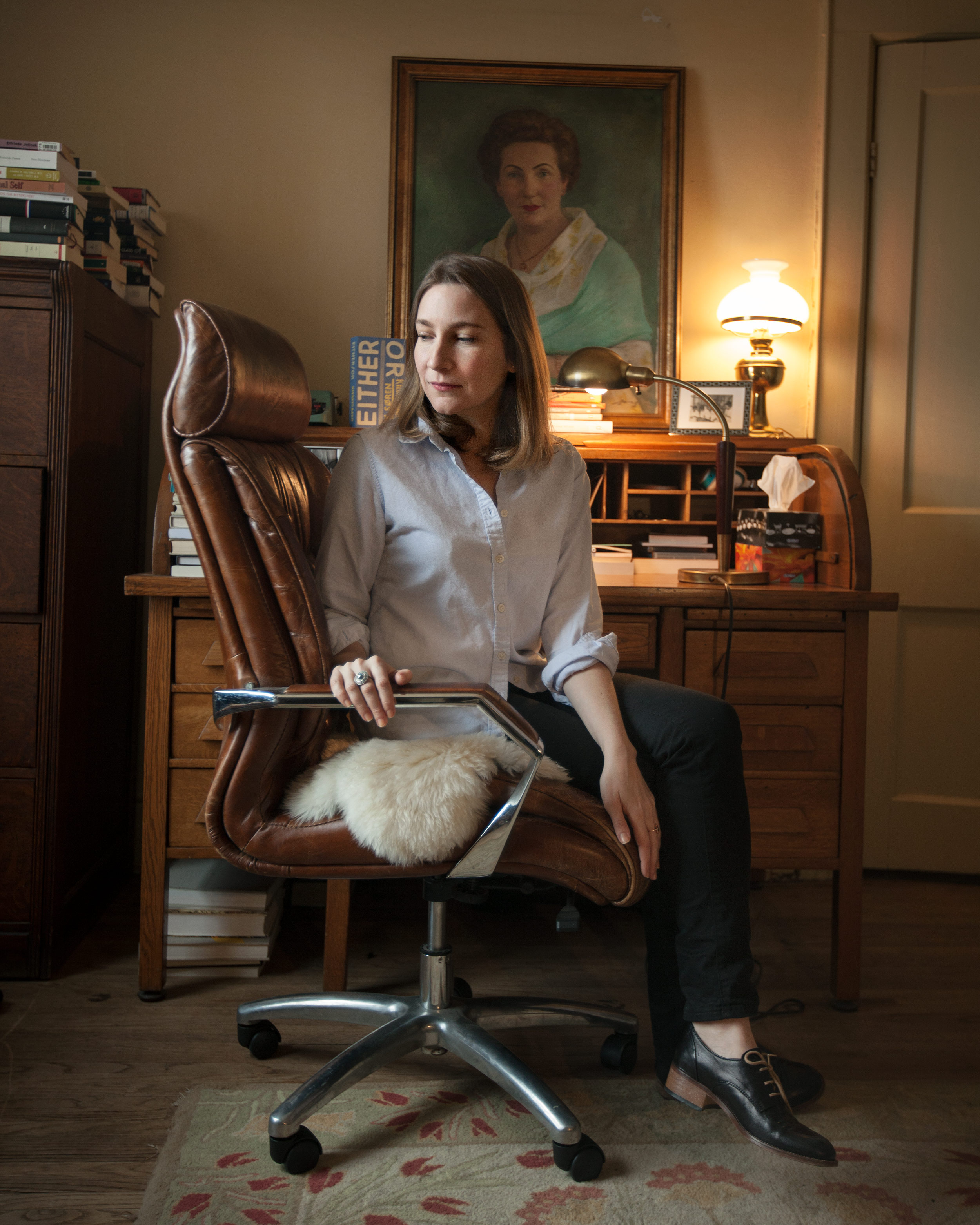
“…around age 21, I made the decision that there was no alternative, there would be no plan B. It was the first time I felt that certainty. It wasn’t just some spiritual thing that came over me.”
It’s interesting that you made the decision to be a writer at 21, but even from what you just mentioned there were still doubts. Can I do this? How long will it take? We compare our timeline to other people’s. I get encouraged when people remind me to think long-term because we have a skewed sense of how long it should take. You’re not born knowing how to write. You have to figure it out, and it takes a really long time. It’s a hard thing to do and you never figure it out. You have the instinct to do it, but you don’t have the skills. I can’t wait to see what I’m writing when I’m in my sixties or seventies, when I’ve lived more and know how to do all of these things in writing that I don’t know how to do yet. There’s ongoing growth.
The other thing I wanted to say about this idea of path is that, of course there were times I doubted my path. That moment when I was 21 was a touchstone for me to look back on. I could remind myself that I had made that commitment. Everyone makes their story seem like this great, heroic journey, but I also think there’s a lot of cowardice that plays into it. When I was 21, I planned to apply to be an intern at Harpers, and move to New York City. I put my whole application together, worked on it for months, and at the last moment I didn’t submit it. Why didn’t I submit my application? It was probably because of fear or lack of courage. But if I’d submitted it, been accepted, moved to New York, and started working in magazines, who knows what my path would have been? It was a moment of lack of courage that also contributed to me writing books. Though I made a good financial decision remaining in Canada because I’ve never had to pay for health care, you know. I didn’t have to get a respectable job. I think your negative and positive traits work together to get you to where you are. But we only want to credit our good qualities for where we end up. I think that’s a mistake.
We can also tend to take more responsibility than we’re due. Sometimes it’s the pure luck of knowing someone or being in the right place at the right time or writing a piece that’s timely and resonates in an unexpected way. So much of it is about putting your work out there and seeing what happens. It’s a continual risk.
“I think that art does good for people beyond the satisfaction of the person making it. It’s something for the world which might alter people a tiny bit or give them something they didn’t have before.”
So, let’s get back to your path. Tell me a little bit about the timeline to give context to the work you’re doing now. Well, I had gone to theater school for playwriting when I was 18. Then I worked at a magazine in Toronto called Shift. And shortly after I had that thought at 21, I went to university. I wasn’t planning to go to university, but I had a mentor who advised me to go, so I did. I studied philosophy and art history.
When I was in school at the University of Toronto, I felt very inspired by what I was learning and reading. That’s when I wrote my first story collection, The Middle Stories, but I didn’t know I was writing a collection. I was just teaching myself how to write. I sent many of those stories away and no one accepted them, but then McSweeney’s accepted five of them for their fourth issue. It blew my mind because everyone said no and I loved McSweeney’s. From there, a publisher contacted me to ask if I had more stories and wanted to do a book. I had thousands of stories (laughing), so I thought about which ones I would use. I chose thirty that I was happy with and published that book with House of Anansi, a publishing house in Canada. From there, I had a publishing house and an agent. And then the main work was around making the work, not in getting published.
Do you feel a responsibility to contribute to something bigger than yourself through the work you do? I don’t know about the word responsibility. I think that art does good for people beyond the satisfaction of the person making it. It’s something for the world which might alter people a tiny bit or give them something they didn’t have before. I don’t know I feel so much of a responsibility as I do an awareness that that’s what art is for, and that’s what art can do. That’s part of why it’s pleasurable—because it circulates in the world as ideas and feelings that people experience.
It seems like you have a sense that you’re part of something bigger, whether or not that’s something you’re consciously thinking about when you’re creating. You realize that what we put out into the world does affect people. Yeah, and it’s hard not to have that awareness, because it’s just the truth, right? I mean, there’s this back and forth that happens when you make something. You’re very much in your own bubble and only thinking about your own fingers on the keyboard, and then you think about the world, and then you go back to thinking about your own fingers. I don’t know how you could ever write without both. You need to feel like you’re absolutely alone in the world and no one is ever going to read what you write—it’s pure privacy and total solitude, and that’s the beauty of it. At the same time, this alternates with the feeling that you’re talking to somebody or a few people.
I was listening to the radio today and, because it’s Valentine’s Day, they were interviewing a couple who had been together for 75 years. They had 7 kids, 13 grandkids, and 20 great grandkids. I think it’s like that with art, too. You put this book or painting into the world, and it also has kids and grandkids and great grandkids. You do have this sensation like, ideally you’re not just creating a kid. There are ideas that come from your ideas, and ideas that come from those people’s ideas. That’s what I like about writing in particular.
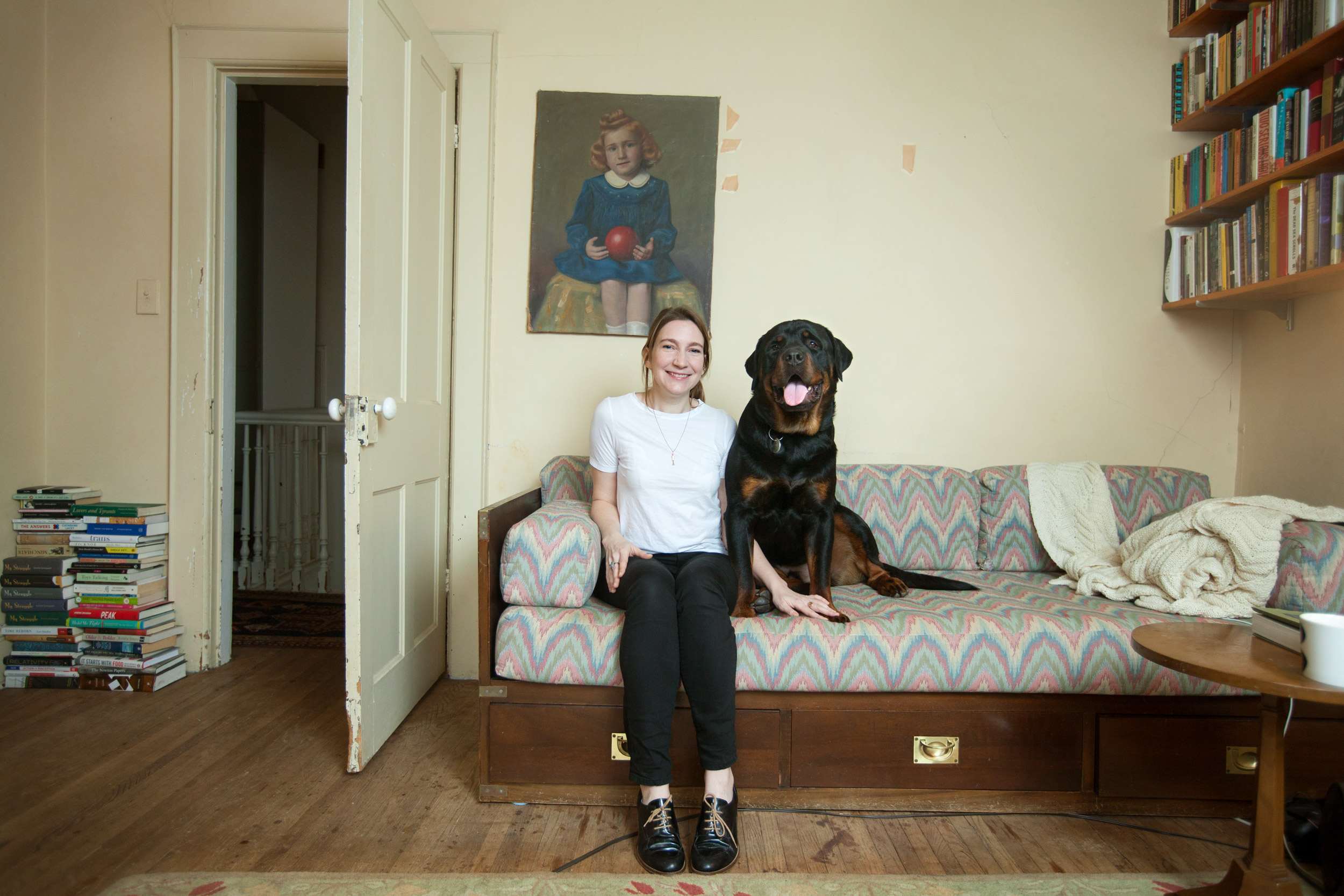
“I think your negative and positive traits work together to get you to where you are. But we only want to credit our good qualities for where we end up. I think that’s a mistake.”
That’s really good. So, you set off to do the work you’re doing now. Do you feel creatively satisfied? On some days. (laughing) I feel grateful and amazed, like, my god, you managed it. Every once in a while I force myself to realize that, because otherwise I just sludge through my day to day responsibilities and feel sorry for myself. But yes, I’m satisfied and grateful to have the freedom to write. That’s what I wanted every day as a kid—to just stay home from school and write stories. And that seems to be my whole life now.
But I don’t feel creatively satisfied every day. It can be very frustrating. Half of the time I feel like I’m not able to make things as good as I want, and what I made yesterday which I thought was brilliant I now think is shit. It’s up and down, but I think it has to be. I’ve come to realize that if you don’t think it’s good some days, then you won’t be excited to keep going, but if you don’t think it’s bad other days, then you’re not driven to make it better. You need both.
That’s interesting because I think there’s a fantasy of what it’s like from the outside looking in. The day to day is still work. I get to do a lot of fun and incredible things, but I also spend a lot of time emailing, planning, and producing. It probably looks very similar to the day of someone who works in an office for a company. It’s just that I work longer hours! I was telling you about that couple on the radio show. They were married in 1941 and they live with their son. Their son was interviewed on the radio after they were, and he said that when he sees them sitting together on the couch watching TV at the end of the day, he thinks, “It doesn’t get any better than that.” I actually laughed out loud. That’s as good as it gets, in love? Sitting on a couch?! That’s not so great.
From the outside, you’re sitting at a computer all day. From the outside, they’re sitting in front of a TV. What’s so great about that? None of this looks great. The things we actually do in a day and where our bodies are is so banal: on the couch, in front of a TV, in front of a computer, in a chair. There’s nothing so great about that. But the feeling of love between that couple after 75 years is really beautiful. The same with being a writer—it’s a pretty banal life, sitting in front of a computer, but at the same time, the feelings you can have doing it—it doesn’t get any better than that.
“You need to feel like you’re absolutely alone in the world and no one is ever going to read what you write—it’s pure privacy and total solitude, and that’s the beauty of it…this alternates with the feeling that you’re talking to somebody or a few people.”
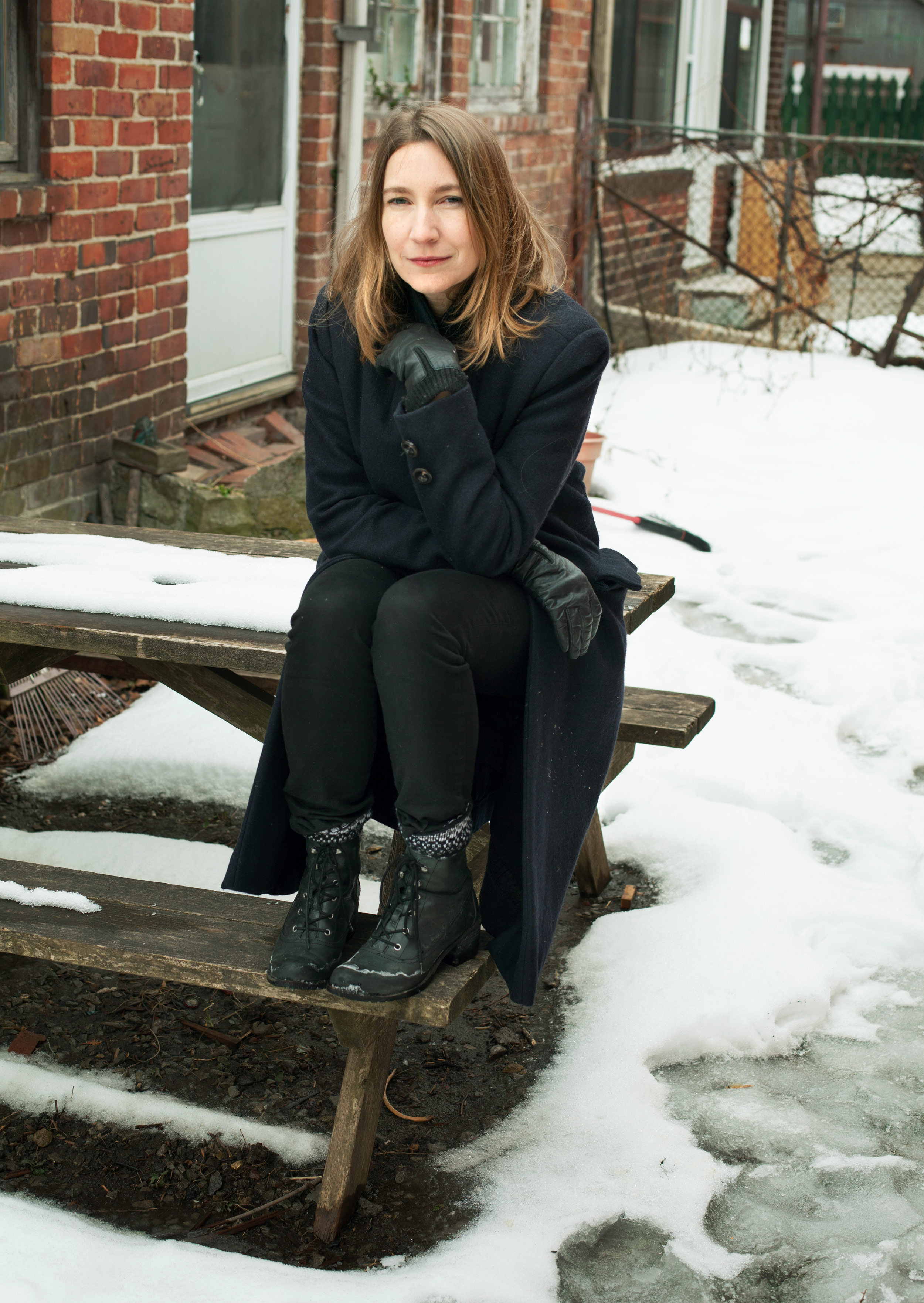
There are highlight moments. For me, they are the moments of connection when I talk to people about their paths and the internal thoughts they wrestle with. I feel like I’m not alone in the things I think or the challenges I face. That knowing and feeling understood is so important. Was it your ambition all along to do this magazine and interview different creative people about about their processes?
Yes, and no. I was following a curiosity. I have a degree in social work and did that for many years in Michigan. This was a side project and something that was born out of wondering how people do creative work for a living. But even as a little girl, I loved writing and interviewing—I used to sit in front of the mirror and pretend to interview myself and others. I was full of questions, and asking questions was how I processed the world. That’s great—the things you were doing as a kid that gave you so much pleasure are the same things you’re doing now. So, is there something beyond this?
I’m sure there is. I honestly can’t say I have a 5- or 10-year plan. I’ve identified some of the things I really enjoy doing, and I want opportunities to do more of those. Otherwise, I’m open to the universe. Writing and interviewing are the main things you enjoy?
Yeah. Me, too. I love interviewing. I was doing interviews at The Believer for so long. I was desperate to do interviews, and then one year something changed and I stopped wanting to interview people. Like you, my entire life, I asked people questions. It was my main method of conversation. Then I started to get sick of it. I wanted to know what I thought instead. For a few years I almost felt allergic to asking people questions. What had previously been a way learning, started to feel to me, at some point in my life, like avoiding my own knowledge.
I like that. You know, I keep thinking about your question about my “Aha!” moment and I told you about that decision I made when I was 21. I want to say one other thing. A lot of people who make art are the same in that we feel we could do anything: write, direct, act. We have so many loves.
I did photography quite seriously in high school, and I directed plays. But when I was around eighteen, I realized that I had to pick one thing and sublimate all of the others into that one—so I chose writing, and I hoped that the photography part of me would come out in writing, and the part of me that wanted to direct plays would come out in writing, and the part of me that wanted to act would come out in writing. It was this really ruthless pruning. By cutting out all of the other forms of creativity, the one left becomes stronger. That was a huge risk and a revelation. It’s really about sublimation. The fewer channels you give for your life force or energy to escape, and the more you lead it all into one channel, the better it is for developing your craft and making that single channel stronger.
That’s great advice. I know it’s something I’ve wrestled with, and I’ve spoken to others who enjoy many things. Which one do you want to focus on? That is the one you pursue. We’re waiting for confirmation or we feel like there’s a right or wrong decision. It’s scary. Sometimes I think we want someone else to tell us what to do. But it’s not so bad to listen to the world. For me, that’s part of how I made my decision. I loved acting, but I was aware that no one had ever said to me that I was a great actress. Whereas I did have friends who loved my stories. I think listening to the world is smart—you listen to yourself and also the world, because the world sometimes knows. People will tell you what you’re good at. I think the world is as good an indicator of what you should do as you, in your own private fantasies, are.
“I think the people I’ve talked to who are exceptional are, for the most part, humble people. They’re not very arrogant. They have a realistic sense that their talent and being able to make art is so tenuous. It could go away.”
For sure. I want to ask if you have a routine or do you make time to write everyday? What I’m getting at is that creative work does take discipline and it is work. You don’t always feel like doing it. How do you approach work when you’re in a moment where you feel stuck or don’t feel like doing it? I go through waves of productivity. I just finished a draft of a book so I was working all of the time, all day long. I wasn’t doing anything else and I didn’t want to go outside. Then I got burnt out and finished that work and for one day I lay in bed and watched the entire season of Insecure. Then I began writing a book review I had to do.
Every day is different, but I try not to let too much time go by without working because when you’ve let too much time go by, it takes so long to get back into it. I usually have three of four big projects going at once. For me, it’s about having enough projects that I’m always in the mood to do at least one of them.
Earlier you mentioned all of the interviews you’ve done for The Believer. You’ve spoken to so many notable artists and writers. I’m curious to know if there was anything you learned about the creative process throughout those conversations? Everybody has their own way and the trick is to figure out your way. The people who do a good job in their field have figured out their way and what works for their metabolism, and their aim. They’ve made up their own rules. I don’t think I’ve spoken to a single artist who’s following someone else’s rules for creation. That won’t get you anywhere.
I think the people I’ve talked to who are exceptional are, for the most part, humble people. They’re not very arrogant. They have a realistic sense that their talent and being able to make art is so tenuous. It could go away. It’s not the most reliable thing. The people I talk to feel grateful that they’re doing it, and that they have the capacity to do it—they’re in awe of that. Even Joan Didion. Even John Currin. They’re not cocky.
When you create, you’re interacting with something very mysterious that you don’t have control over. It’s like being in a great love relationship. You don’t know when it’s going to end, and it’s a shaky thing, because you’re not the only participant. The other person is a participant, too, and then there’s this third thing, which is whatever you have between you. I think it’s like that with art, too. It’s not just you. It’s the world, too, and this third thing which makes it possible, which you don’t really have control over.
I like that analogy. Art is like a great love affair.
“When you create, you’re interacting with something very mysterious that you don’t have control over. It’s like being in a great love relationship. You don’t know when it’s going to end, and it’s a shaky thing, because you’re not the only participant.”
